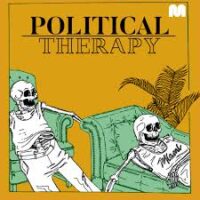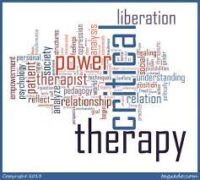
Political Therapy–2
Last week, I explored how a simple question my therapist asked led me to rethink how I’m writing my new book on activism in the 2020s—Connecting the Dots. Now, I want to take the implications of her questions one far more important step forward. Answering her immediate question will make the book more useful to more people outside of the activist community
However, its real importance will almost certainly lie in one of her question’s implications that I hadn’t really thought of until I started writing last week’s post and therefor could only allude to it there.
I realized that I had missed the boat when it came to a way of thinking about my work before our session even though it had been staring me in the face for years.
Being in therapy has helped me immeasurably. 
Yet, I’d never asked myself if thinking in terms of society-wide therapy might help us get out of the mess we find ourselves in today.
As I’ll suggest at the end of the post, societal therapy won’t solve all of our problems. But, to the degree that we need to rethink our cultural norms and the values that underlie them, there is no better place to start.
Societal Therapy
As anyone who has worked with more than one therapist knows, there is no single model they all follow. Still, there are some common therapeutic denominators that are mirrored in what the activist groups I’m researching all do. And, not everything we have done in therapy could or should be carried over to the kinds of movements I work in. Add to that the fact that Dr. X hasn’t helped me with everything I need to do in my own practice of society-wide therapy. Most obviously, we haven’t had to spend a lot of time developing my empathic skills, although our society definitely needs a hefty dose of training along those lines.
But, for the most part, the individual issues she has helped me work on have their national and even global counterparts. Consider these which strike me as the important (but, as you will see in the next section, the most difficult):
- Holistic. All good therapists encourage their patients to dig deeply and explore what we social scientists call the roots causes of our problems and do in a holistic way. No mental stone gets left unturned. The same will have to be the case if we are going to deal with such deeply rooted issues as climate change or systemic racism.
- A Focus on Emotions. All human relationships have one thing uncommon that we social scientists overlook too often. Emotions and feelings matter at least as much as the facts s. All of the great psychoanalysts from the time of Freud on have drawn links between personal and social trauma as well as other feelings and emotions that don’t take such a heavy toll.
- Ambiguity. Therapists help us understand why our personal and emotional lives are so messy. We need to so the same when it comes to the big issues that are dividing our country. If psychotherapists help us deal with the ambiguity and discomfort inside our own heads, “social therapists” can do the same in our communities and countries.
- Anger. Most people I know and, more importantly, most people I disagree with are angry with the status quo in the United States. Understandably so. Even for the folks who occupied the Capitol with whom I have next to nothing in common. The questions is how we can best deal with that anger. Therapists help us deal our personal anger. We social therapists need to do the same, not by simply being nice but by channeling the anger in ways that could lead to more constructive outcomes for us all.
- Reframing Among Dr. X’s biggest accomplishments with me has been to get me to redefine or reframe the way I view myself in profound ways. We peacebuilders who have roots in the world of mediation use the term reframing all the time because we help parties to a dispute view it from new perspectives that open the door to more constructive outcomes.
- No quick fixes. Nearly ten years in therapy have taught me that there are no quick fixes when it comes to working on myself and that making progress takes time.There are times when a few sessions with a therapist are enough to make a big difference in someone’s life. American insurance companies certainly feel that way.However, if an individual’s problems have deep roots—let alone if a society’s problems have deep roots—you can’t hope to make much progress if you only spend a few week’s on your therapist’s metaphoric couch (Dr. X actually has a reasonably comfortable chair instead). The notion that we will need to take a lot of time does not sit well with either our political leaders or our fellow citizens all of whom at least assume that there are some metaphorical silver bullets that will fix our problems once and for all. As our discussions today about going back to normal suggest, we are reluctant to learn that we will not stop climate change or overcome systemic racism with the passage of a single law or through the work of any single group of activists. These are generational challenges.
Getting a Society Into Therapy
In our decade together, Dr. X has led me on an intriguing and rewarding journey. But like most people who end up in therapy, I didn’t volunteer to go. Family members had to nudge me into making that first appointment. If I’m fully honest, it took more than a nudge. I resisted their suggestions and while I never quite got to the “kicking and screaming” stage, I certainly was reluctant.
Therein lies the second link between individual and social therapy. Most of us are reluctant to admit that our cultural norms and political behavior are so out of sync and that we therefore need something akin to long term mental health care.
I didn’t know what I was getting into when I started, but I don’t think I planned on a decade—even though a childhood friend who is also a psychiatrist talks frequently about patients he has worked with for twenty years or more.
 There have been signs that lots of us were prepared for something like an extended period of healing at the height of the crisis a year ago. We were going to reconsider what we think about race. And public health. And economic in equality. And climate change.
There have been signs that lots of us were prepared for something like an extended period of healing at the height of the crisis a year ago. We were going to reconsider what we think about race. And public health. And economic in equality. And climate change.
Now, we seem to want to just go back to normal. Given the isolation of the last year, it could hardly be otherwise.
Yet, opportunities still exist to use the recovery for creating what my friends at Imperative21 call an economic reset and then take it beyond the economy. In fact, most of the people I’ll be focusing on in my book are doing just that. And many are young enough to be my grandchildren. Here are just a few of them
- My colleagues at the Mary Hoch Center for Reconciliation are exploring how we can help people around the world deal with the traumas that the pandemic both caused and reinforced
- We have joined with dozens of others to promote racial healing and transformation in the US covering everything from the ways our kids learn to the ways our police enforce the law
- Zebras Unite, Imperative 21, and others are trying to create a new economy in which entrepreneurs work for the good of the entire society
- Friends whose primary interest lies in spirituality and self help are exploring ways that they can reshape the society as a whole as well as our personal lives
- Stranger’s Guide is working to help us discover new ways of traveling
- We’ve all watched Greta Thunberg rocket to fame but haven’t noticed that she has done so as part of a movement embraced by millions of high school students. The same is true of the newest wave of gun control advocates here in the United States
We’ll Need More Than Societal Therapy
 As I said at the beginning of this post, societal therapy alone won’t be enough. We will need public policy changes as well. Still, as we’ve learned most recently from the marriage equality movement, lasting change at the policy level normally follows on the heels of our adoption of new cultural norms.
As I said at the beginning of this post, societal therapy alone won’t be enough. We will need public policy changes as well. Still, as we’ve learned most recently from the marriage equality movement, lasting change at the policy level normally follows on the heels of our adoption of new cultural norms.
A few weeks ago, I told Dr. X that I would still have some kind of role in producing change in the United States and around the world when the Brood X cicadas return to the Washington DC area seventeen years from now—when I’ll be 90. Above and beyond my fear of dying, the reason was obvious. The world will still need societal therapy whatever progress we make while the cicadas are lying dormant underground.
I didn’t say anything about whether I expect to still be in therapy then, and she didn’t ask…
The views and opinions expressed in this article are those of the author and do not necessarily reflect the official policy or position of the Alliance for Peacebuilding or its members.
Also published on Medium.
